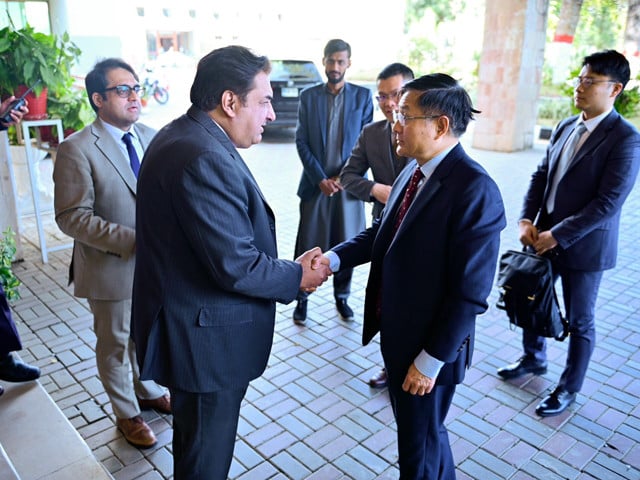ISLAMABAD:
Days after China officially accepted the credentials of Bilal Karimi, the Taliban-appointed ambassador to China, President Xi Jinping’s close aide visited Islamabad on Friday, raising eyebrows about a potential alignment of interests between China and the Taliban-led Afghan government.
President Xi Jinping had earlier accepted the credentials of Bilal Karimi, marking the first formal acknowledgment of the Taliban government by any nation. This move, though not explicitly clarified by China, has been interpreted by observers as a ‘tacit recognition’ of the Afghan Taliban government, which has struggled to secure international recognition.
In the aftermath of this development, Chinese special envoy on Afghanistan, Ambassador Yue Xiaonyou, engaged in discussions with Pakistani authorities, including Foreign Secretary Syrus Qazi and Additional Foreign Secretary (Afghanistan and West Asia) Ambassador Rahim Hayat Qureshi.
Additional Foreign Secretary (Afghanistan & West Asia) Ambassador Rahim Hayat Qurehi @rahimhayat today received Chinese Special Envoy on Afghanistan Ambassador Yue Xiaoyong. They underscored their commitment to a peaceful & stable Afghanistan and emphasized the need for enhanced… pic.twitter.com/WrrmzLzkBs
— Ministry of Foreign Affairs – Pakistan (@ForeignOfficePk) February 2, 2024
A joint statement issued by the foreign office highlighted the commitment of both nations to a peaceful and stable Afghanistan, emphasising the necessity of enhanced coordination for regional stability.
While the statement did not delve into specifics, sources suggest that China’s recent actions were a focal point of the discussions. China’s decision to accept the Taliban Ambassador without regional consensus raised concerns, as it departed from earlier agreements among neighbouring countries to collectively decide on recognising the Taliban government.
Also read: Has China formally recognised Taliban govt in Afghanistan?
China’s growing engagement with the Taliban government has drawn attention, with some speculating that this ‘solo flight’ approach could enhance China’s influence in the region, potentially benefiting Pakistan in the long run.
However, China’s move has not alleviated its concerns about terrorist activities in Afghanistan. Specifically, China is apprehensive about the East Turkestan Islamic Movement (ETIM), a group it considers a terrorist outfit.
Recent reports indicate the relocation of ETIM from Badakhashan to Baghlan province, prompting China to remain vigilant about potential security threats emanating from Afghanistan.
Surprisingly, China’s step toward recognising the Taliban contradicts the benchmarks set by the international community, including the formation of an inclusive government, allowing girls’ education, permitting women to work, and ensuring Afghan soil is not used by terrorist groups.
The United States, adopting a cautious stance, is exploring the possibility of reopening its consulate in Kabul, stressing that such a move does not equate to the recognition of the Taliban government.
The State Department’s strategy maintains that the Taliban must fulfill commitments, including forming an inclusive government, facilitating girls’ education, enabling women to work, and preventing Afghan soil from being used by terrorist groups posing a threat to the US and its allies.







